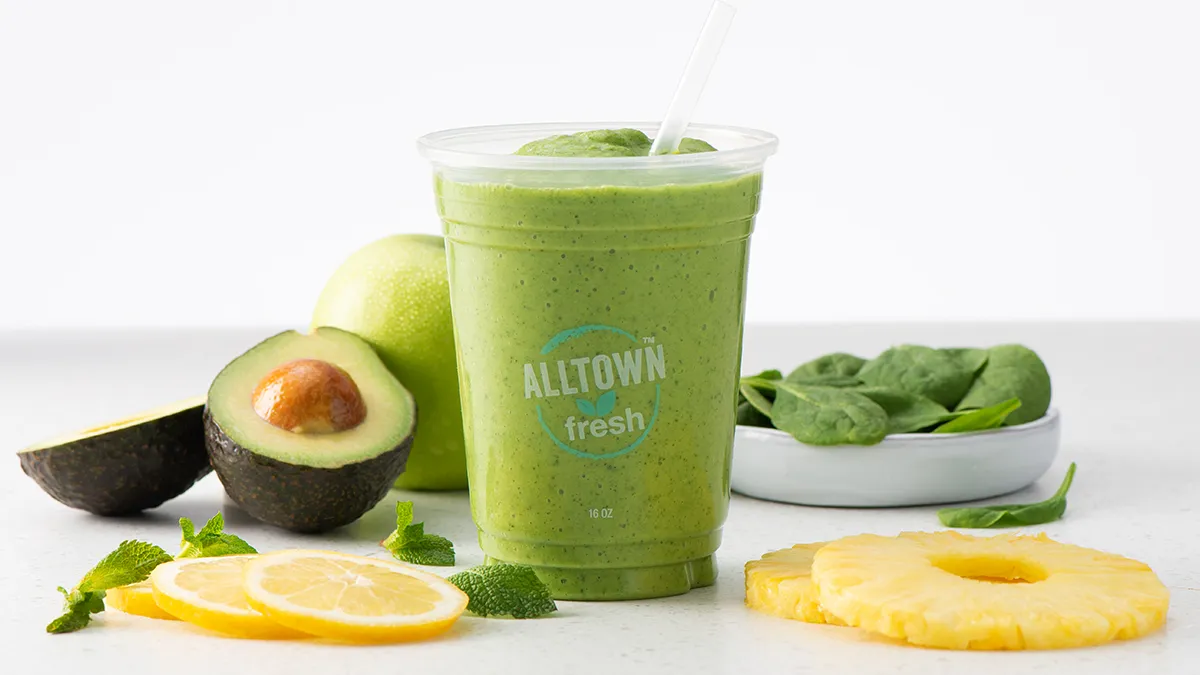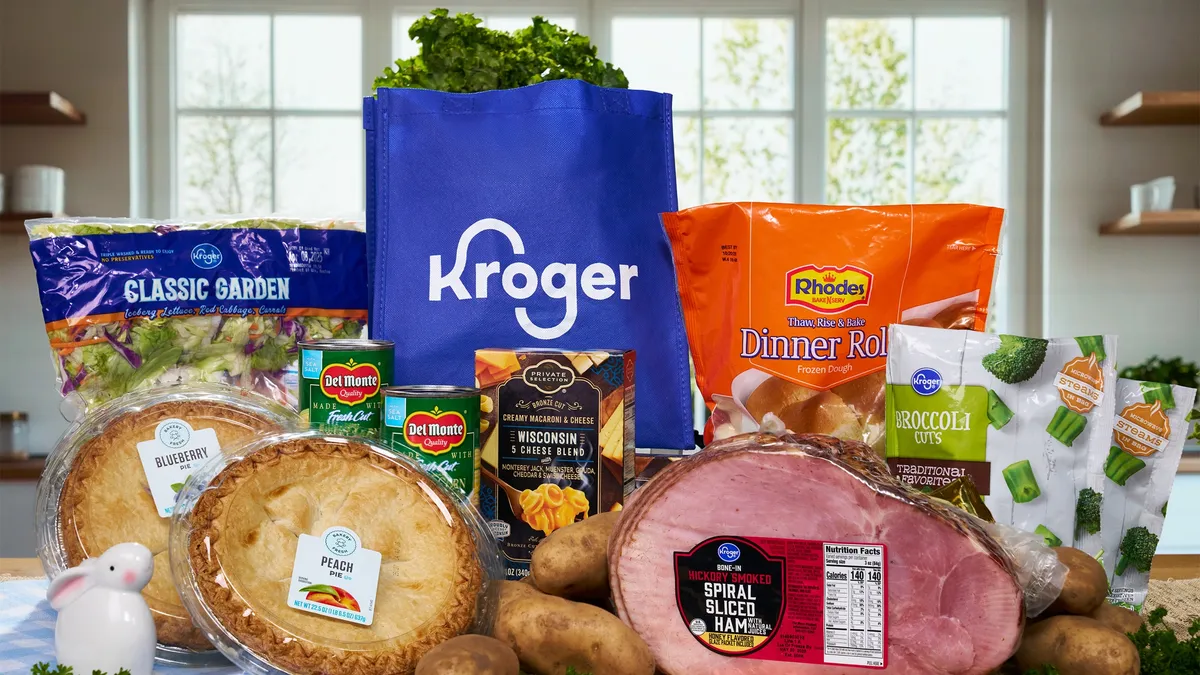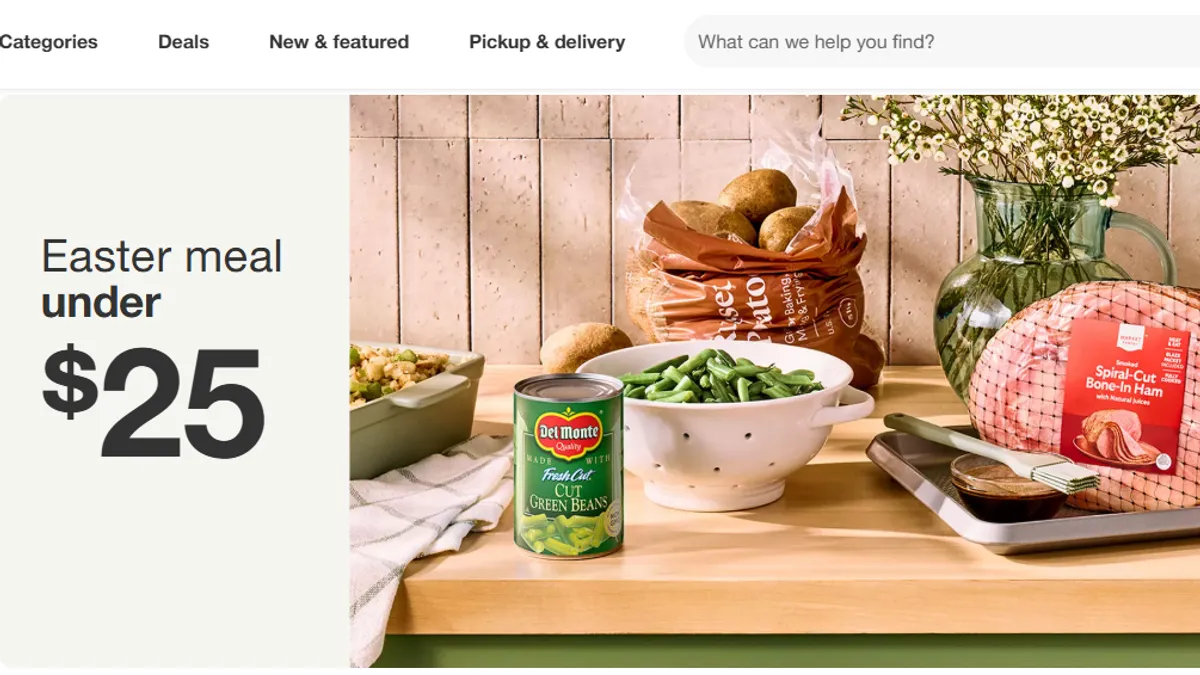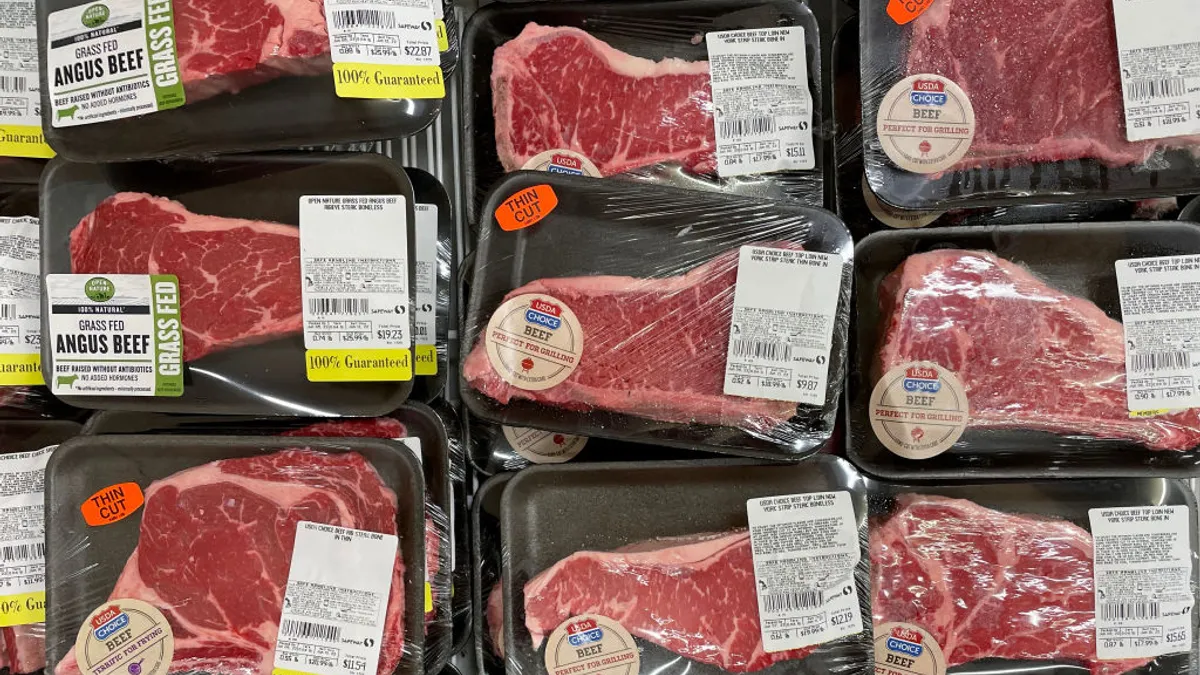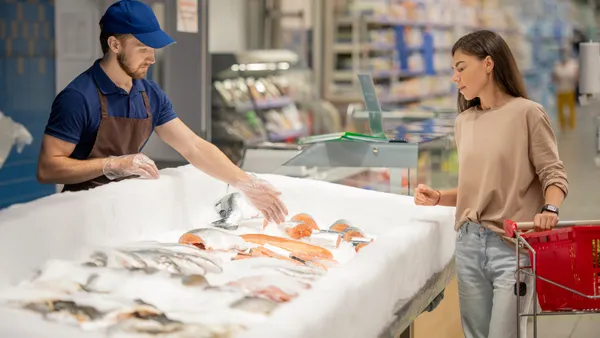This is the latest article in a series looking at prepared foods and meal solutions at grocery stores. You can read the additional articles here.
When shoppers walk into the Boise Co-Op in the North End neighborhood of Boise, Idaho, one of the first things they'll see is the grocery store's full-service smoothie, juice and coffee bar.
Here, customers can order fresh, made-to-order smoothies, juices, coffee and espresso beverages. The co-op also makes fresh juice each morning and keeps glass jars of it in a refrigerated case for shoppers to take on the go.
"We're using only organic fruits and vegetables in the juices and smoothies that we make, which is not common in the area," Mo Valko, Boise Co-Op's marketing manager, told Grocery Dive.
The co-op, which operates two locations, is one of many grocery retailers that have added made-to-order beverage bars to its stores in recent years. The service isn't cheap and doesn't work in every market, but for the right customer set it can sweeten the in-store experience while also meeting their evolving health demands.
Smoothies, on-tap kombucha and house-roasted coffee beans
For retailers that serve health-conscious shoppers, a beverage bar may be worth a closer look. According to Andrew McFarlane, founder and CEO of Start A Juice Bar, a full-service consultancy that helps companies start juice and smoothie businesses, it's a way to boost loyalty and regular visits.
"If you are a grocery store, there’s obviously a relationship to health that people are associating you with their well-being." he told Grocery Dive.
In Plymouth, Massachusetts, fresh-focused convenience store Alltown Fresh, which opened in January, offers a made-to-order smoothie and coffee bar and also has an extensive self-service beverage program that focuses on healthy beverage alternatives. Some of the options include all-natural, organic kombucha on tap, organic soda and fresh juices from Tractor Beverages.
"Guests come in and they can order on a touchscreen kiosk that's really intuitive and fun and easy to use, and then those orders get sent to the kitchen and they get made right there and the guests can see the whole thing happen," Shauna Seidenberg, Alltown Fresh’s category marketing manager of dispensed beverage, told Grocery Dive.
Both Boise Co-Op and Alltown Fresh have extensive coffee selections at their beverage bars, too, and for good reason. Coffee consumption remains high among Americans, with 63% of consumers reporting they drank some in the past day, according to 2019 data from the National Coffee Association. Of those surveyed, 61% chose gourmet coffee drinks and 39% selected non-gourmet.
Boise Co-Op offers hot tea, coffee and espresso beverages, and the grocer recently began roasting its own coffee and espresso beans in-house using a zero-emissions Bellwether coffee roaster. According to Valko, the Boise Co-Op is the first grocery store in the world to have one of the roasters.
The co-op also decided years ago not to upcharge for alternative milks like coconut or almond.
"We felt it was important not to punish people financially for making those decisions," Valko said.
The coffee at Alltown Fresh is also unique, particularly in the self-service area. The retailer is equipped with a "bean-to-cup" Swiss-made coffee machine, which serves up boutique coffee at the push of a button, Seidenberg said. Customers can choose blends from around the world, including fair trade and organic options in hot or iced form.
"The machines are specially designed to press beans under five bars of pressure so they give the maximum flavor," Seidenberg said.
Alltown Fresh customers can also get made-to-order espresso beverages, cold brew and nitro brew from behind the beverage bar.
Customers demand healthier choices
One common thread among retailers offering smoothie and juice bars is that they are serving health-conscious consumers who are willing to spend more on products they think are good for them.
Among larger retailers, Whole Foods has a well-established made-to-order beverage offering with its Allegro coffee and beverage bars. Specialty formats like Cub Foods' recently opened urban store in Minneapolis have become testing grounds for beverage bars, while small upscale chains like Nugget Market in Northern California have made them a core part of the business.
Other grocers have chosen to partner with a third-party company to provide made-to-order beverage services. Target stores have Starbucks, for example, and Hy-Vee will open its first of several Smokey Row Coffee Co. outlets in an Iowa store this fall. The local coffee chain serves up beverages as well as sandwiches and ice cream.
Seidenberg said that she definitely sees unfulfilled consumer demand in the market for healthier beverage options.
"We know that our guests are raising the bar on what they're putting in their bodies, and we're raising the bar to meet those needs," she said.
The industry outlook for better-for-you beverages is positive. The organic beverage market is expected to reach at least $55 million by 2025, and 62% of consumers are looking for natural beverage options according to 2018 research from Beverage Industry. The market for kombucha and fermented beverages grew 31.4% from 2017 to 2018, according to SPINS.
"I think anybody who's going to make a sizable investment in their business or in starting a new business has to ask themselves what's the longevity of this."

Andrew McFarlane
Founder and CEO, Start A Juice Bar
McFarlane said juice and smoothies are not a trend as much as a reflection of how people want to eat and drink now. People have become "hip to their diets," he said, and he believes there is still significant potential in the market for more good-for-you beverage bars.
"I think anybody who's going to make a sizable investment in their business or in starting a new business has to ask themselves what's the longevity of this," he said. "My sense is it’s not really going anywhere and we're many, many years out before we hit saturation."
Valko agrees, saying that the co-op's customers love coming in and getting something quick and made-to-order that they can also feel good about putting into their bodies.
Operations and ROI
Adding a full-service beverage bar to a grocery store requires significant investment in special equipment, additional products and specially trained employees.
One leg-up grocers in starting an operation is easy access to fruits and vegetables, McFarlane said. This keeps additional costs for inventory low and also helps stores use up produce that might otherwise go bad before it sells.
"Just on a cost-savings for cost of goods, it's a phenomenal service to provide on that front," McFarlane said.
Space considerations are also important, especially at a time when every square inch matters to grocers. Operationally, they need to consider what products and services will offer the highest return per square foot, McFarlane noted.
Smoothies and salads, for example, generate more revenue while juice requires more space and can cause more food waste and higher costs. McFarlane said 30% to 40% of the products used in juicing end up in the trash because of the fibers that are removed in the process.
At Alltown Fresh, Seidenberg said the return is worth the investment because it's satisfying customers and bringing them back.
"Any time you’re going to offer more products it's going to be a little bit more of an investment. It's more that in-store beverage capabilities overall have proven to be really successful for the Alltown Fresh brand," she said.
When it comes to owning the operations in-house or farming it out to a third-party, McFarlane said there are upsides to both options. Generally, if a retailer can handle operations in-house, they’ll have more long-term value and strengthen their own brand and business. On the other hand, there is less risk and responsibility in partnering with a beverage provider if a retailer doesn’t want to finance a build-out, train staff and put a new system in place.
Staffing and labor is key to ensuring smooth operations in a beverage bar. McFarlane said employees will need special training on how to operate the space and prepare drinks.
Alltown Fresh puts employees through a "hands-on" training regimen that helps them understand every aspect of the service. The Boise Co-Op, meanwhile, trains its beverage bar staffers to handle coffee as well as juice and smoothies. These employees are also cross-trained in deli so that if there’s down time, beverage staff can step over to assist at the deli counter.
"It requires more labor but we’re able to be pretty efficient about it." Valko said.



